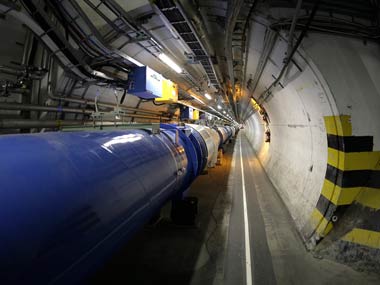A world in the throes of economic and social turmoil was transfixed for a few fleeting hours on Wednesday by the prospect of the game-changing scientific discovery of the Higgs boson particle.
The microdetails of what the discovery implies for particle physics are too abstruse for lay minds such as mine to grasp. Keener scientific minds, though, have distilled the significance of the discovery in a way that makes it rather more accessible ( for instance, here ).
To me, however, the biggest takeaway from the discovery, when you zoom out and cut out the clutter, is that it shows up the redemptive power of the human spirit.
Here was a truly international team of scientists, working with unity of purpose, on one of the fundamental mysteries of the universe. And working thus, they have cracked an enduring puzzle - and validated the theoretical findings that predicted the existence of what has come to be called the ‘God particle’.
[caption id=“attachment_367175” align=“alignright” width=“380”]
 The discovery tells us a little bit about our place in the universe. AP[/caption]
The discovery tells us a little bit about our place in the universe. AP[/caption]
The riddle holds answers to why stars, planets and everything in the universe - you and I included - exist at all. At its core, it unlocks the answer to that foundational existential question that we’ve all dwelt upon at one time or another: why are we here?
In that sense, by this elaborate scientific process of ‘reverse engineering’, we’re only beginning to fathom what those who are given to faith call the “spark of divinity” that gave birth to the universe.
Impact Shorts
More ShortsIn Angels and Demons, a work of fiction that was later adapted for a Hollywood thriller , the writer Dan Brown posited the discovery of the ‘God particle’ - and the creation of ‘antimatter’ - as the point where science and faith collide at supersonic speeds, much like the particles in the Large Hadron Collider.
But rather than set the stage for an apocalyptic ending, in the way that it does in the film, the real-world discovery holds out rather more optimistic messages for humanity as a whole. For one, it validates the endeavour of scientific quest, and rekindles the passion for discovering the unknown.
(If you really want to feel that passion, just talk to your ten-year-old nephew or niece about yesterday’s discovery: even if s/he has at best a limited understanding of its implications, you will be struck by how just the romance of scientific discovery gets young minds ticking.)
For another, it shows us, in a way that we don’t often get to experience, that despite all the differences that characterise us, the human race has a shared destiny.
Today, we talk glibly of globalisation, and we assimilate and celebrate other cultures. But except when we experience a global economic meltdown - and when a financial crisis on Wall Street inflicts pain in Dharavi - we don’t feel bound together as people of one world. Wednesday’s discovery gives us a positive reaffirmation of our oneness.
The discovery is also significant for one other reason. It shows us that when a global team of scientists collaborates to crack a puzzle, however complex and foundational it may be, it can find the unity of purpose to unscramble it.
That collective will is also being harnessed in other areas: from finding a cure for cancer to more mundane areas of scientific endeavour.
Sure, the ingenuity of the human mind sometimes leads it astray, but despite all the prophesies of doom and gloom all around and for all the decline in values that we rant about, the world is evolving into a better place - civilizationally speaking - than it was.
Above all else, the discovery validates the faith that if the collective human spirit can be tapped for the greater good of mankind, we can understand our true place in the universe. Whether you are a person of faith or an agnostic practitioner of abstruse sciences, that must count as the final frontier of knowledge.
Venky Vembu attained his first Fifteen Minutes of Fame in 1984, on the threshold of his career, when paparazzi pictures of him with Maneka Gandhi were splashed in the world media under the mischievous tag ‘International Affairs’. But that’s a story he’s saving up for his memoirs… Over 25 years, Venky worked in The Indian Express, Frontline newsmagazine, Outlook Money and DNA, before joining FirstPost ahead of its launch. Additionally, he has been published, at various times, in, among other publications, The Times of India, Hindustan Times, Outlook, and Outlook Traveller.
)